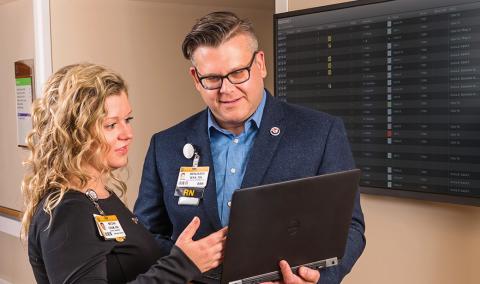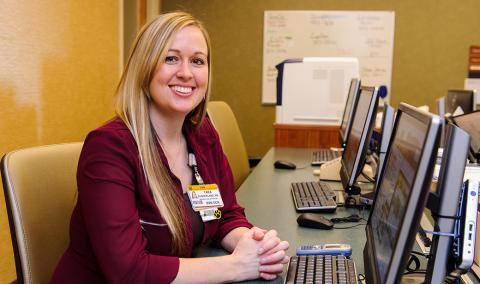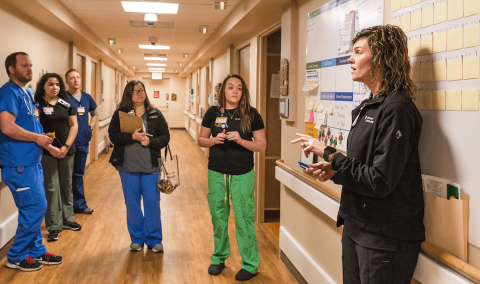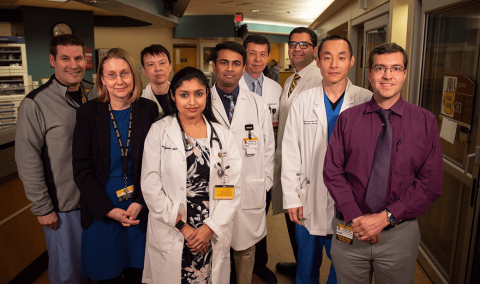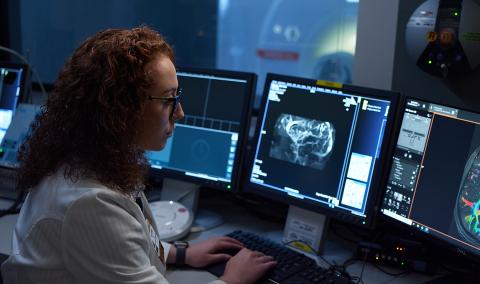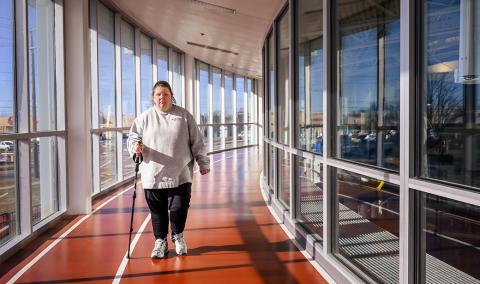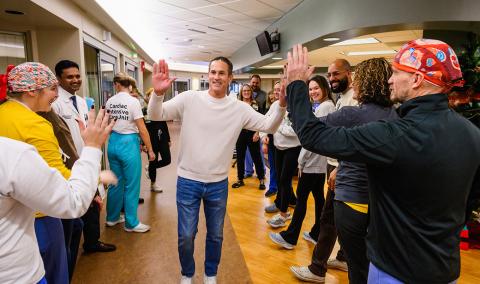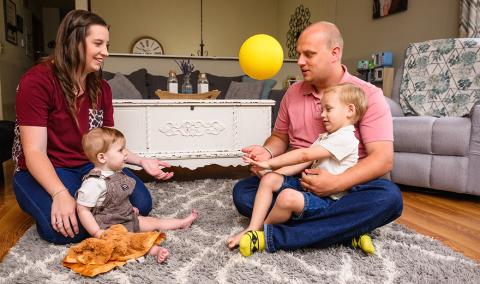Why is MU Health Care’s rating with CMS being reduced to one out of five stars? Why are MU Health Care’s payments being reduced by CMS?
As a tertiary referral center and Level 1 trauma center, MU Health Care works to save the lives of the most desperately ill and injured patients. People from across the state often are transferred to MU Health Care from other hospitals and arrive with multiple chronic conditions and complex health care needs.
Periodically, CMS adjusts the way it calculates hospital acquired conditions (HACs), a key metric in its assessment of hospital quality and safety. Previously, patients transferred to MU Health Care from other hospitals were excluded from many of these HAC calculations. However, with CMS’ recent adjustments, more of these patients are now included. This change in calculations has negatively impacted MU Health Care’s ratings. CMS also adjusted the ways it calculates the overall hospital rating, and changed the weight of one aggregate HAC measure, which caused a large change in our score.
These ratings do not fully reflect the progress MU Health Care has made in a number of key areas critical to patient care, including marked improvements – according to CMS data from 2017 through 2018 – in patient experience, effectiveness of care and timeliness of care.
Is it still safe to come to MU Health Care? What does this mean for patient care?
At MU Health Care, quality and safety are our top priorities. We are committed to quality improvement and are continuously evaluating our performance to ensure our patients ultimately receive the best care.
Each and every patient deserves the highest quality of care at all times, and any failure to deliver on that promise is taken seriously within our facilities. That said, it is important to recognize the very small percentage of patients who experience patient safety events (PSI) events each year.
We are proud to serve as mid-Missouri’s only designated level 1 stroke, STEMI and trauma center, and Missouri’s only designated cancer center. These distinctions – as well as national recognition for our excellence in orthopaedics, urology and nephrology – reflect the high level of quality care provided to all those we serve.
What steps are being taken to ensure MU Health Care provides the highest quality and safest care to patients?
At MU Health Care, quality and safety are our top priorities. We are committed to quality improvement and are continuously evaluating our performance to ensure our patients ultimately receive the best care.
Our commitment to quality involves setting high goals, implementing systematic modifications and changes in processes, constantly measuring performance, and making subsequent improvements to increase the effectiveness and efficiency of processes and procedures.
We are continuing to focus on quality and safety initiatives in the areas of highest impact to patients and have further mobilized leadership across the organization to address areas where there are specific needs for performance improvement.
We have been implementing specific efforts to address many of the measures where we were underperforming and have already made marked progress in safety of care (including hospital acquired conditions), readmissions and mortality. More than 1,600 quality improvement projects have taken place across our health system over the past three years including:
- Establishing new expert teams and implemented new protocols to address hospital acquired conditions (HACs) and post-operative risks.
- Ensuring our staff is collaborative and proactive, establishing expert teams and ownership of quality and safety specific to patient care.
- Improving planning, coordination and education for staff, patient and families as well as leveraging partnerships and data to reduce the risk of readmissions.
- Collecting and analyzing data to inform standardized performance improvements, focusing on clinical areas key to reducing mortality.
We take CMS ratings seriously and appreciate the opportunity to reflect on new ways to improve as we are continually striving for excellence, which is driven by our mission to save and improve lives. We will continue to provide exceptional care to everyone who comes through our doors.
How are the CMS ratings compiled? Which measures most negatively impacted MU Health Care’s CMS ratings?
CMS’s Hospital Compare overall hospital rating summarizes up to 57 quality measures across seven areas of quality – mortality; safety of care; readmission; patient experience; effectiveness of care; timeliness of care; efficient use of medical imaging – into a single star rating for each hospital.
A hospital summary score is calculated by taking the weighted average of these group scores.
In addition to changes in the number of patients transferred in from other hospitals who were included in patient safety indicators (PSI-90) calculations for MU Health Care, CMS also changed the weight of this composite measure, CMS’ safety of care calculation. Specifically, the weight of PSIs within this area changed from a weight of 15 percent in the safety of care area to a weight of almost 70 percent in the safety of care area. This change negatively affected MU Health Care’s CMS rating.
What is the timeframe for the data that informed these adjustments? Why are CMS’ ratings delayed?
The data that resulted in MU Health Care’s reduction in Medicare payments was collected in 2014 through 2017. The CMS-collected data that informed the one-star rating was collected from 2014 through early 2018.
Since the launch of its Overall Hospital Quality Star Ratings program in 2016, CMS has made numerous updates and delayed release of ratings multiple times, noting a need for additional time to understand stakeholder concerns regarding the impact of the changes.
How does MU Health Care measure data? What tools does it use to track patient metrics and outcomes?
MU Health Care measures patient safety data in multiple ways. We identify patients with conditions related to PSI-90 measures during inpatient care based on charting in the medical record and immediately post discharge, as the diagnosis and procedure codes are assigned and confirmed based on the technical definitions. MU Health Care’s Clinical Analytics team provides an initial case finding, and the coding team provides the case finding at the close of inpatient care.
The PSI-90 measures are based up on coded conditions, and MU Health Care has a feature in its software that triggers additional review and consideration of these coded conditions by medical coders. These tools allow MU Health Care to evaluate possible and confirmed cases for these conditions to ensure the documentation and care is accurate.
MU Health Care also uses a database from Vizient, the largest member-driven, health care performance improvement company in the country, to confirm the patient cases that will fall into the CMS definitions for PSI-90 measures. Vizient reports on PSI measures within 45 days, which is far faster than what CMS provides. Through Vizient resources, MU Health Care can compare performance to other academic medical centers, access best practice information, and learn from others who are doing well.
When do you expect MU Health Care to see its progress reflected in CMS’ ratings?
Many of the metrics CMS assesses in its ratings reflect a wide range of time; in some cases, CMS considers data from the last five years in its calculations. The reporting and analysis varies; however, we expect that due to the lag in time between the submission of data and the follow up review by CMS the positive results we are already witnessing will not be published for one to two years.
We take seriously CMS ratings and appreciate the opportunity to reflect on new ways to improve as we are continually striving for excellence, which is driven by our mission to save and improve lives.
What steps should patients take to ensure they are receiving the safest, highest quality care?
Patients and their families have an important role to play when it comes to patient safety. Medical research has shown that strong communication between patients, their families and caregivers help prevent many medical errors.
MU Health Care urges patients to:
- Openly share your full health history with your caregiver. This includes the medication you take, any operations you have had, and any allergies. The more your caregiver knows, the more successful your care plan and recovery will be.
- Ask questions before you accept a medication you don't recognize.
- Ask questions if you don't understand something about your care or have concerns about it.
- Remind caregivers and visitors to wash their hands before they care for you or visit you. Wash your own hands to reduce the risk of infection.
- Know how to take care for yourself at home and make sure your family members learn what to do, too.
- Fill out a survey if you receive a patient satisfaction survey after your visit to MU Health Care. Your responses help us improve the care we provide.
Patients can learn more at muhealth.org/quality.
How can patients ensure they are doing their homework and making informed health care decisions?
Health care is complex, and it is important that patients do their homework to ensure they are selecting the best care for their unique needs. When choosing a hospital, patients should consider many factors, including areas of expertise, national recognition of excellence, physician specialties, and the experiences of friends and family.
MU Health Care provides information about its commitment to quality and continual improvement to care, its quality data, and ways its quality of care compares to other hospitals in Missouri and across the country at muhealth.org/quality.
What is the total payment reduction that MU Health Care will receive based on CMS’ hospital acquired conditions (HAC) program? Will this affect MU Health Care’s financial standings?
MU Health Care’s Medicare payments will be reduced in federal fiscal year 2019 through CMS’ HAC program. This reduction, based on data collected in 2014 through 2017, is equal to 1 percent of Medicare payments, approximately $800,000 in October 2018 through July 2019.
While we never want to face any reduction in reimbursement, we are in strong financial standing and will continue to focus on sound and proactive cost management that promotes growth and development for our organization and that is in the best interest of our employees, physicians and all those we serve.
Will the new ratings from CMS affect MU Health Care’s ongoing negotiations with SSM Health to transfer ownership of St. Mary’s Hospitals in Jefferson City and Audrain?
No. SSM Health chose to enter into exclusive negotiations with MU Health Care because of our strengths as a leading academic health system and our potential to enhance the strong existing local specialty care and services. Through our ongoing diligence process, MU Health Care leadership is working closely with SSM Health to understand all facets of our respective organizations; this includes a deeper dive into our commitment to quality and performance measures.
While we are certainly disappointed about the most recent ratings from CMS, MU Health Care continues to be a leader in providing quality care and we believe this potential transaction will create a new level of stability for health care throughout this region, helping to ensure everyone has greater access to care that is crucial to maintaining the health of the communities we serve.
How does MU Health Care’s rating compare to other academic medical centers and critical care hospitals?
MU Health Care has been ranked in the top half of all academic medical centers by Vizient, the largest member-driven, health care performance improvement company in the country. Vizient’s quality and accountability rankings specifically account for the differences in patient populations seen by academic medical centers like MU Health Care.
Because of MU Health Care’s depth of expertise and innovation, people from across the state often are transferred to our facilities from other hospitals and arrive with multiple chronic conditions and complex health care needs. Even compared with other academic medical centers across the nation, MU Health Care receives a high number of transfers from outlying facilities, according to Vizient data.
Independent analysis by Kaiser Health News, the Association of American Medical Colleges and others finds that academic medical centers, like MU Health Care, are disproportionately subject to payment reductions by CMS for HACs due in part to the complex medical needs of their patient populations. Research published in the Journal of the American Medical Association (JAMA) further outlines that hospitals penalized more frequently by CMS for HACs also provided more advanced services, were major teaching institutes, had received more quality accreditations, and had better performance on other process and outcome measures.
We are proud to provide care to the most desperately ill and injured patients. While we recognize that this can negatively impact key measures and metrics that are heavily weighted in CMS’ ratings, inherent in our mission to save and improve lives is a steadfast commitment to care for all patients and we will continue to provide exceptional care to everyone who comes through our doors.



